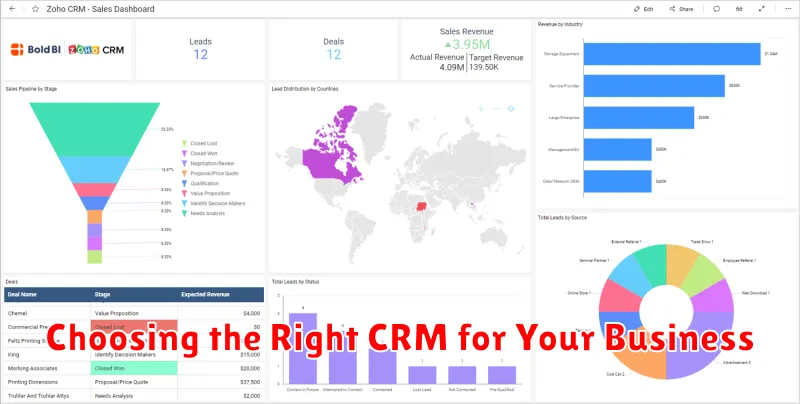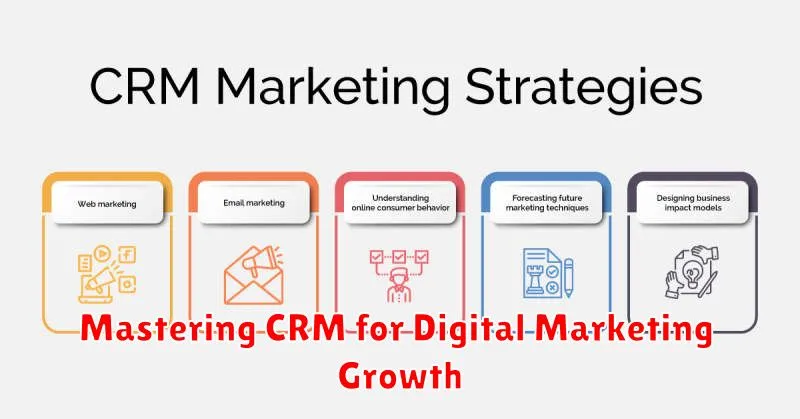In today’s competitive digital landscape, Customer Relationship Management (CRM) systems are no longer just a nice-to-have, but rather a critical tool for driving digital marketing growth. Mastering CRM is essential for businesses looking to build stronger customer relationships, personalize marketing efforts, and ultimately, increase revenue. This article will delve into the essential strategies and tactics needed to leverage the full potential of CRM for achieving significant digital marketing improvements. From lead generation and nurturing to customer segmentation and analytics, we’ll cover the key aspects of using CRM to maximize your marketing ROI and achieve sustainable business growth.
Whether you are a seasoned marketer looking to optimize your existing CRM strategy or a newcomer eager to understand the fundamentals of CRM for digital marketing, this comprehensive guide will provide valuable insights. We will explore how CRM integration with other marketing platforms can streamline your workflow and amplify your marketing impact. Learn how to effectively use CRM data to create targeted marketing campaigns that resonate with your audience, improve customer engagement, and drive conversions. This journey to mastering CRM will equip you with the knowledge and skills needed to transform your digital marketing efforts and achieve significant growth.
What Is CRM in Digital Marketing?
In the context of digital marketing, CRM (Customer Relationship Management) is a strategy and technology used to manage and analyze customer interactions and data throughout the customer lifecycle. Its goal is to improve customer service relationships and assist in customer retention and drive sales growth.
CRM systems compile customer data across different channels, or points of contact, between the customer and the company, which could include the company’s website, telephone, live chat, direct mail, marketing materials and social media.
Choosing the Right CRM for Your Business

Selecting the right Customer Relationship Management (CRM) system is crucial for maximizing your digital marketing ROI. A well-chosen CRM can streamline operations and boost growth, while a poor fit can hinder progress. Consider your business size, budget, and specific needs when evaluating options.
Focus on features that align with your marketing goals. Do you need robust email marketing automation? Detailed sales tracking? Or perhaps integrated customer support functionalities? Prioritize the essential features and avoid paying for functionalities you won’t utilize. A scalable CRM can adapt to your evolving business needs.
How CRM Helps You Understand Customers
A CRM system centralizes customer data, providing a 360-degree view of each individual. This includes their purchase history, communication preferences, and interactions with your brand.
By analyzing this data, you can identify trends and patterns in customer behavior. This allows you to segment your audience more effectively and personalize marketing campaigns for better engagement.
CRM facilitates improved customer service by equipping your team with the information they need to address customer inquiries and resolve issues promptly.
Email Personalization Using CRM Data
Email personalization leverages CRM data to create targeted email campaigns. By using customer information like name, purchase history, and demographics, businesses can craft more relevant emails.
This data-driven approach strengthens customer relationships and drives conversions. Personalization goes beyond simply inserting a customer’s name. It’s about delivering the right message, at the right time, based on individual customer profiles.
Integrating CRM with Marketing Tools
Integrating your CRM with marketing tools is crucial for maximizing your digital marketing ROI. This integration creates a seamless flow of data between systems, enabling personalized and targeted campaigns.
By connecting your CRM to email marketing platforms, social media management tools, and marketing automation software, you gain a unified view of customer interactions. This allows for more effective lead nurturing, improved customer segmentation, and enhanced campaign analytics.
Automation Workflows That Save Time
Efficient CRM automation allows marketers to focus on strategic initiatives by streamlining repetitive tasks. Key workflows include lead nurturing, where automated email sequences guide prospects through the sales funnel.
Automated campaign tracking analyzes performance data, providing insights for optimization. Task management automation assigns and tracks activities, ensuring timely follow-up. Integrating these workflows frees up valuable time and enhances overall productivity.
Using CRM for Lead Scoring
Lead scoring within a CRM helps prioritize leads based on their potential to convert. Assigning points based on criteria like engagement, demographics, and behavior allows sales and marketing teams to focus efforts on the most promising prospects.
A well-defined lead scoring system improves sales efficiency and marketing ROI by nurturing high-potential leads, ultimately leading to faster sales cycles and increased revenue.
Tracking Customer Lifetime Value (CLTV)
Customer Lifetime Value (CLTV) represents the total revenue a business can reasonably expect from a single customer throughout their relationship. Tracking CLTV is crucial for understanding the long-term impact of marketing efforts.
By analyzing CLTV, businesses can identify high-value customers and tailor marketing strategies to better retain them. This data also informs budget allocation for customer acquisition and retention initiatives. Accurately measuring CLTV allows for more effective resource allocation and optimization of return on investment (ROI).
Tips to Improve CRM Adoption
User involvement is crucial. Involve key users in the selection and implementation process to ensure the CRM meets their needs.
Provide comprehensive training and ongoing support. Users are more likely to adopt a system they understand and feel comfortable using.
Highlight the benefits of CRM adoption. Clearly communicate how the CRM will improve their daily workflows and contribute to overall business goals.
Start with a phased rollout. Focus on implementing core functionalities first, then gradually introduce advanced features to avoid overwhelming users.
Gamification and incentives can encourage active CRM usage and data entry, leading to greater adoption rates.
Common Mistakes to Avoid
Implementing a CRM effectively requires a strategic approach. Avoiding common pitfalls is crucial for maximizing your return on investment and achieving your marketing objectives. One frequent mistake is inadequate training. Teams must be proficient in using the CRM system to capture and leverage data effectively.
Another critical error is neglecting data hygiene. Inaccurate or incomplete data hinders personalization efforts and reporting accuracy. Furthermore, failing to integrate your CRM with other marketing tools limits its potential, preventing a unified view of customer interactions.
Finally, not defining clear goals and KPIs can lead to ineffective CRM usage. Establish measurable objectives from the outset to track progress and demonstrate the impact of your CRM implementation.

